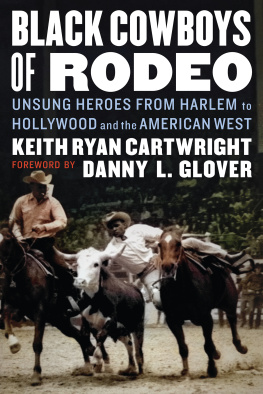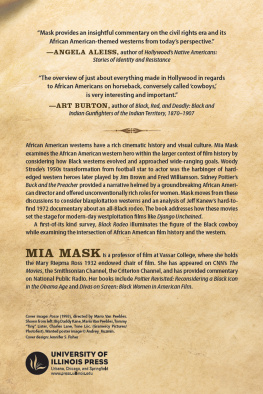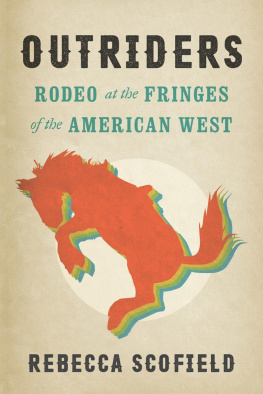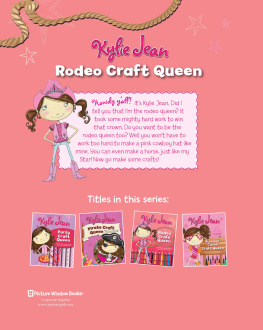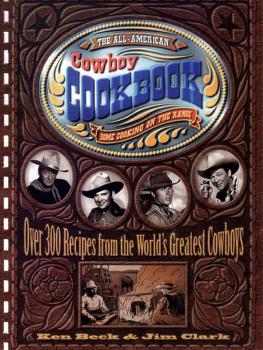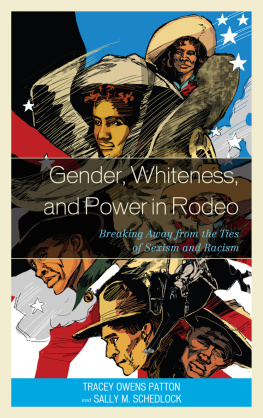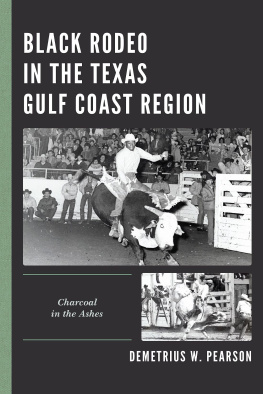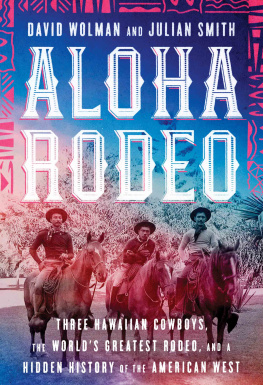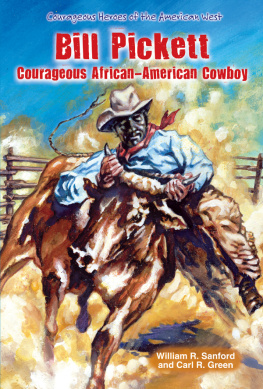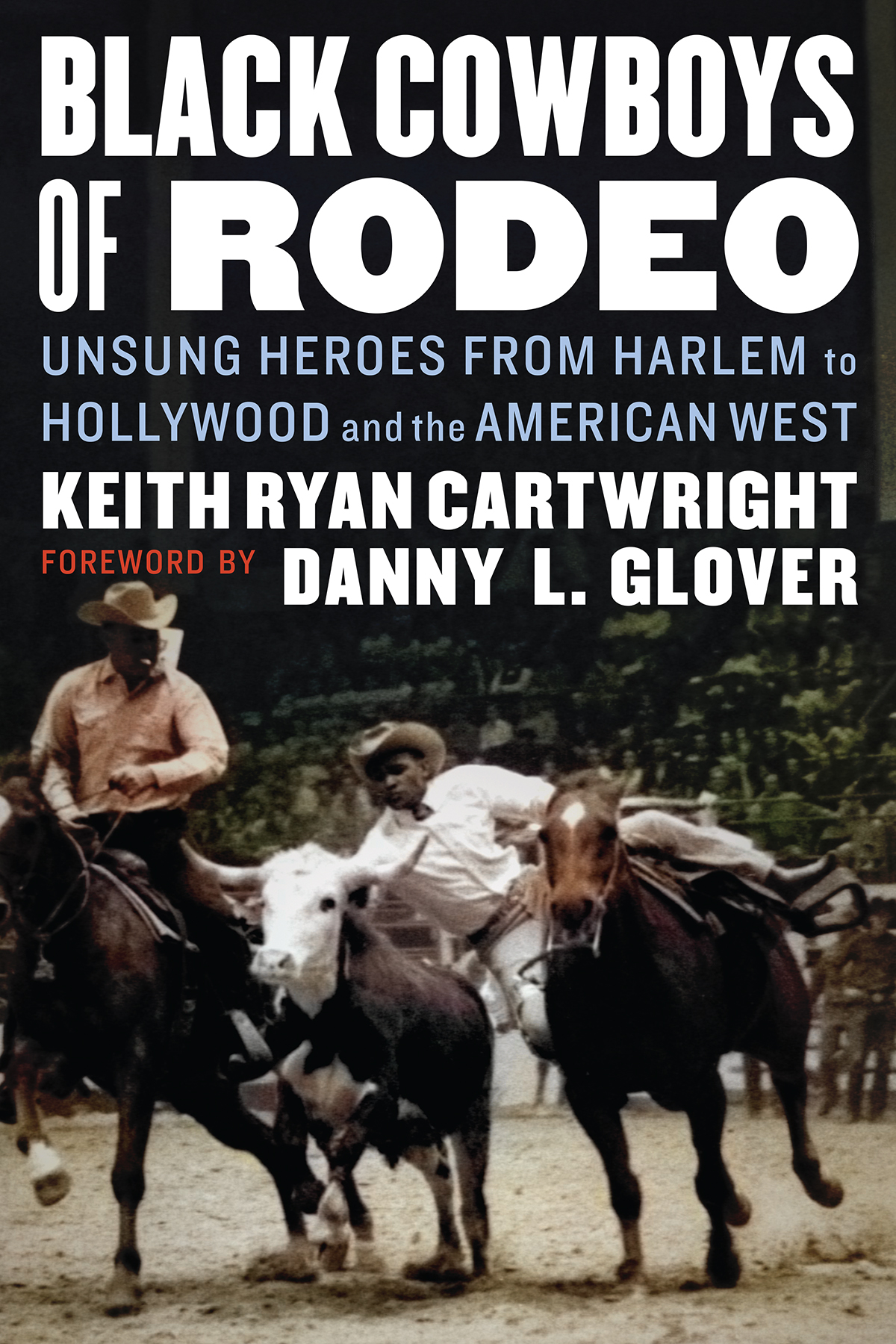
Keith Ryan Cartwrights book is an essential corrective to the lily-white history of the cowboy and the American West that has been promoted by motion pictures and white supremacists for centuries. It works as both a sweeping look at the cowboy ethos and profiles of scores of [those] whose greatness made America.
Nelson George, author, filmmaker, music and culture critic
Can I get a yee-haw? Black Cowboys of Rodeo is a marvel of a bookbuilt with muscular research and smooth writing, resurrecting larger-than-life characters who will amaze and inspire readers. Cowboys have long been symbols of American grit and self-reliance. Black cowboys are that and more. Thank goodness their stories are finally being toldand told so beautifully.
Jonathan Eig, best-selling author of Ali: A Life
Hollywood has not always been on the right side of history when it comes to portraying Black cowboys, but a thoroughly researched book like Black Cowboys of Rodeo finally amends that narrative.
Blair Underwood, actor, producer, and director
Keith Ryan Cartwrights masterful excavation of the contribution of Black cowboys to American history is both rich and timely. The engaging stories of the individuals in Black Cowboys of Rodeo chronicle the lives and struggles of men who were not only field hands and laborers but family men, businessmen, entertainers, and entrepreneurs. This book will be illuminating to many still unfamiliar with the important role they played in the taming and shaping of the American West.
Yohuru Williams, founding director of the Racial Justice Initiative at the University of St. Thomas
Keith Ryan Cartwright is a master storyteller, who has accomplished what could be considered his lifes work in his first attempt. This is a very important book coming at an equally important time.
Ty Murray, nine-time Professional Rodeo Cowboys Association world champion
From the Gene Autry epigraph that opens it, this entire book is a revelationa lively and comprehensive look at a subculture, but one that spills its bounds to become a sweeping panorama of American life. Depression-era foreclosures, the Tomb of the Unknown Soldier, crashing the Oscars, John Waynes Dollar and Roy Rogerss Trigger, plus cameos from Willie Nelson, Medgar Evers, Aretha Franklins ex-husband, and Muhammad Ali (on horseback!)hold on for the ride, because Black Cowboys of Rodeo will buck off every one of your preconceptions.
Alexander Wolff, best-selling author of The Audacity of Hoop: Basketball and the Age of Obama
Black Cowboys of Rodeo is a much-needed look at the lives of modern Black cowboys. For too long this story has been overlooked. But that omission stops with this book. Keith Ryan Cartwright takes readers on a journey from farm life in Oklahoma, to the Jim Crow South, the bright lights of Hollywood, and the streets of Harlem. Filled with stories of famous men like the legendary Bill Pickett and many other unheralded Black men who scraped their way to make a living in rodeo, Cartwright has produced a beautifully written manuscript about Black manhood.
Louis Moore, best-selling author of We Will Win the Day: The Civil Rights Movement
With the vivid, detailed portraits in Black Cowboys of Rodeo, Keith Ryan Cartwright not only chronicles a series of brave and pioneering lives; he also fills in a missing and vital piece of Americas cultural history.
Alan Light, Sirius XM host, best-selling author, and former editor-in-chief of Vibe and Spin magazines
There is nothing quite so tantalizing as hidden history. Remember what it felt like to be a young person, when it seemed like grownups were conspiring to hide the truth? In this case, they were. In reading a book like Black Cowboys of Rodeo, young people searching for identity find their heroes.
Erin Alvarado, high school librarian and co-founder of the Southeastern Young Adult Book Festival
Black Cowboys of Rodeo
Unsung Heroes from Harlem to Hollywood and the American West
Keith Ryan Cartwright
Foreword by Danny L. Glover
University of Nebraska Press | Lincoln
2021 by Keith Ryan Cartwright
Foreword 2021 by Danny L. Glover
Cover designed by University of Nebraska Press; cover photo courtesy of the Ferrell Butler Rodeo Photographs, Dickinson Research Center, National Cowboy & Western Heritage Museum. RC2013.038.19620223.
Author photo Andy Watson.
An earlier version of chapter 25 previously appeared in The Undefeated, February 3, 2020. Reprinted courtesy of ESPN .
All rights reserved
Publication of this volume was assisted by a grant from the Friends of the University of Nebraska Press.
Library of Congress Cataloging-in-Publication Data
Names: Cartwright, Keith Ryan, author.
Title: Black cowboys of rodeo: unsung heroes from Harlem to Hollywood and the American West / Keith Ryan Cartwright; foreword by Danny L. Glover.
Description: Lincoln: University of Nebraska Press, 2021. | Includes bibliographical references.
Identifiers: LCCN 2021006509
ISBN 9781496226105 (hardback)
ISBN 9781496229489 (epub)
ISBN 9781496229496 (pdf)
Subjects: LCSH : African American rodeo performersBiography. | RodeosSocial aspectsUnited States. | RodeosUnited StatesHistory.
Classification: LCC GV 1833.5 . C 37 2021 | DDC 791.8/4089607300922 [B]dc23
LC record available at https://lccn.loc.gov/2021006509
The publisher does not have any control over and does not assume any responsibility for author or third-party websites or their content.
Former Washington Post president and publisher Philip L. Graham once lamented that news serves as the first rough draft of history. Unfortunately, when it comes to more than 150 years of Black cowboys, a vast majority of those drafts were wrong, and the few that had it right were either ignored, lost, or, at best, forgotten.
The profiles chronicled in Black Cowboys of Rodeo, and the thousands of other Black cowboys those stories represent, are my small part in a much larger and ongoing effort to write a second draft and, in the process, correct history.
This is for those who never had their story told.
Much love,
KRC
He must not advocate or possess racially or religiously intolerant ideas.
From Gene Autrys cowboy code
Contents
Danny L. Glover
In many ways, the story of the cowboy is a story of how Americas cultural identity came to be. The rugged bravado, heroism, triumph over the wilderness, individualism, and iconoclasm that animate Americas mythology are partially rooted in the cowboy mythos and have been universalized in the United States as emblematic of a quintessentially American national character. But as much as these ideals can be taken as a definitive piece of Americana, the story of the American cowboy is also implicitly about race. As a result, we must ask who and what constitutes an American and then interrogate the basis upon which one would make that determination.
For most people in the twentieth and twenty-first centuries, the cumulative impact of Buffalo Bills Wild West Show, the Western memorabilia industry, and, of course, the Western movie genre has been a portrait of the American cowboy as invariably white and prototypically male. But is that popular perception accurate? How did African Americans factor into the history of the American cowboy? Cowboys, first and foremost, were agricultural workers in the latter half of the nineteenth century. In centering the Black cowboy, it seems almost pedantic yet counterintuitive to note that newly freed African American slaves and sharecropperswho almost by definition were highly skilled agricultural workerswere a critical component of the cowboy labor forcenearly 25 percent. Why then is there such a paucity of representation for them?
Next page
